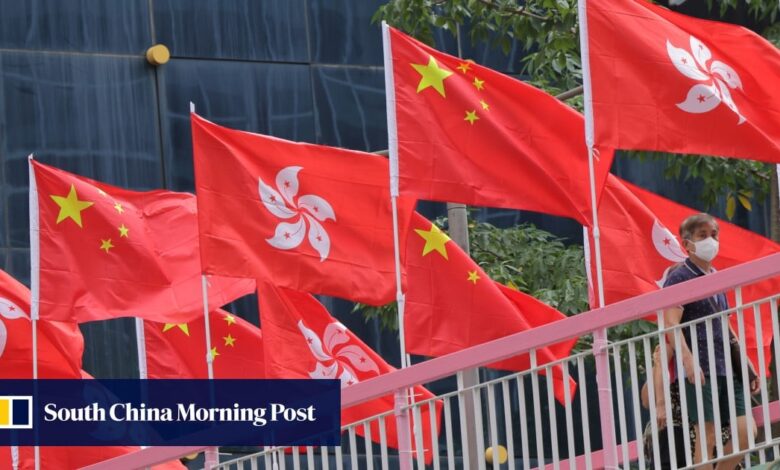Beijing’s top office for Hong Kong affairs given expanded to-do list after upgrade, including improving accountability system for city leader

Improving the accountability system under which the city leader answers to central authorities is among newly listed responsibilities for Beijing’s top office overseeing Hong Kong affairs, it has emerged.
The office, which was earlier upgraded to a higher-level outfit reporting directly to the Communist Party, has also been tasked with facilitating patriotic education and safeguarding national security.
Observers on Friday said the expanded list of 11 major duties shown on the revamped website of the Hong Kong and Macau Work Office, which reports to the party’s Central Committee, signalled Beijing’s determination to exercise its “comprehensive jurisdiction” over the city.
Top Beijing office overseeing Hong Kong affairs holds first meeting after revamp
Top Beijing office overseeing Hong Kong affairs holds first meeting after revamp
The 11 responsibilities – almost double the number listed for the previous office – include new items such as helping Hong Kong and Macau strengthen education on the constitution, the Basic Law, and national security law, as well as on Chinese history and culture, to enhance residents’ “national consciousness and patriotic spirit”.
Other new tasks include implementing legal and enforcement mechanisms to safeguard national security in Hong Kong, proposing measures to improve the city leader’s accountability system with Beijing, and managing local journalists and media groups based in mainland China.
The office also has similar duties to when it came under the State Council, such as implementation of the “one country, two systems” governing principle and offering advice over legal amendments concerning Hong Kong and Macau.
Under the office’s upgrade, 10 bureaus focusing on different areas have been set up. One is tasked with coordinating with Hong Kong authorities in safeguarding national security, while some others are responsible for facilitating exchanges on political, economic, cultural, educational and legal aspects.
What an induction trip by 2 state officials on Hong Kong, Macau affairs tells us
What an induction trip by 2 state officials on Hong Kong, Macau affairs tells us
The new office convened its first meeting in July – with Xia Baolong remaining as director and assisted by five deputies – after the reform plan was endorsed at the nation’s two key annual political gatherings in March.
Veteran politician Tam Yiu-chung, who formerly served as the city’s sole delegate to the nation’s top legislative body, said the reform showed the great importance that central authorities attached to the city.
Noting its wide-ranging responsibilities, Tam argued the office would strengthen the ties between the central and Hong Kong authorities, which would boost the city’s socio-economic development and help it to solve deep-rooted problems.
“The new structure is more comprehensive, which makes it easier for coordination when Hong Kong is in need of help from the central government,” he said.
Lau Siu-kai, a consultant at semi-official think tank the Chinese Association of Hong Kong and Macau Studies, said the office’s new duties reflected Beijing’s move to exercise its comprehensive jurisdiction over the city.
Pointing to the office’s new task of improving the accountability system for the city leader, as well as the mechanism for the central government to appoint or remove key local officials, Lau said he expected Beijing to be more involved and cautious in naming ministers in future.
“Key officials are currently nominated by the city leader to be endorsed by Beijing,” he said.
“But is it possible for central government officials to get more of a chance to understand their backgrounds and assess them at an earlier stage to ensure these people are patriotic? These may be details Beijing hopes to institutionalise and make more concrete.”
Top Beijing official overseeing Hong Kong affairs set for 6-day visit to city
Top Beijing official overseeing Hong Kong affairs set for 6-day visit to city
Earlier this week, Chief Executive John Lee Ka-chiu announced fresh initiatives to promote patriotism, including establishing a Chinese Culture Promotion Office. They were part of his administration’s response to a new patriotic education law passed by the National People’s Congress Standing Committee, the top legislative body.
Lau said he expected Beijing to guide Hong Kong closely in promoting patriotic education in coming years given the teaching materials “must reference” those of the mainland.





